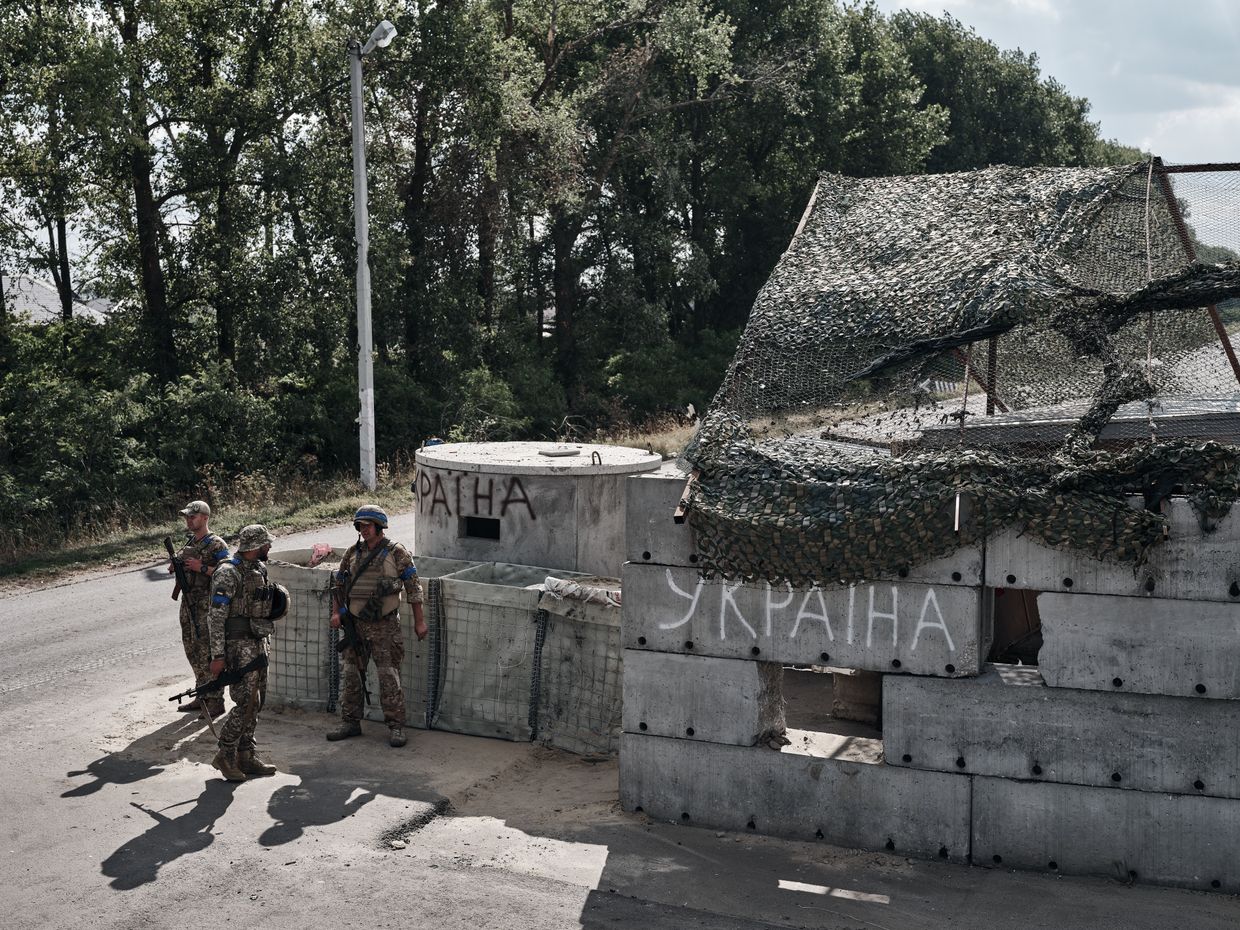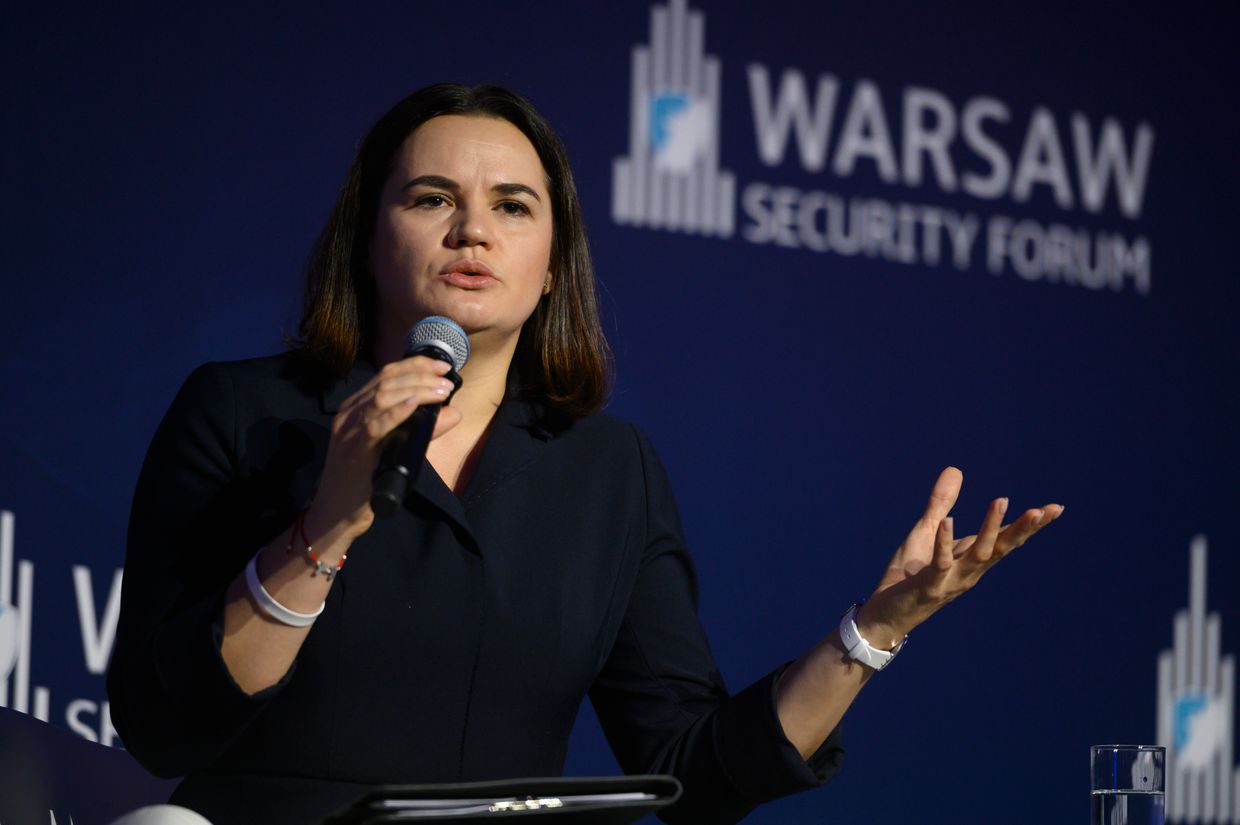Torn apart by infighting, without a plan, what comes next for Russia’s opposition?

Yulia Navalnaya, the widow of late Russian opposition figure Aleksei Navalny, is thronged by media as she waits for an Uber after she voted at the Russian Embassy in the Russian elections in Berlin, Germany, on March 17, 2024. (Sean Gallup/Getty Images)
When Russian opposition leader Alexei Navalny died in an Arctic penal colony in February 2024, the country’s liberal dissidents vowed to carry on their mission: to end the rule of Russian President Vladimir Putin.
Eight months on, however, and Russia’s opposition is bitterly divided, with little to no vision of how to carry on the promised fight.
Their grievances resonate far beyond the negotiating table.
In September, the Navalny-linked Anti-Corruption Foundation (FBK) accused fellow dissident Leonid Nevzlin of orchestrating a violent hammer attack on its former CEO, Leonid Volkov, on the streets of Vilnius. Nevzlin denies the claims.
The accusations tore through the already tattered relationship between the FBK and the opposition circles to which Nevzlin belongs, headed by exiled oligarch Mikhail Khodorkovsky – so much so that Khodorkovsky accused Navalny’s allies of “waging a campaign” to discredit him.
The FBK, meanwhile, faces allegations of its own.
Opposition activist Maxim Kats released a two-hour video on Oct. 1 accusing the group of rehabilitating the reputations of two Russian businessmen accused of fraud by accepting their donations. The FBK is yet to comment on the investigation in-depth, saying it will instead release a more detailed response after its own analysis of Kats’ documents.
“We will have to do this at the expense of our real work,” FBK chairwoman Maria Pevchikh complained on X. “Time that should be spent on matters that are actually important will have to be spent on this.”
Both episodes capture a snapshot of the issues that face Russia’s opposition: open suspicion or outright hostility between rival groups, and a lack of agreement on what the movement’s key goals should be. But with no solution on the horizon - and Moscow’s war machine continually on the march – what comes next for Russia’s opposition in exile?
A tumultuous history
Infighting is nothing new for Russia’s liberal opposition. Many of the most divisive splits are generational: politicians who were active in the 1990s, such as Mikhail Khodorkovsky and Garry Kasparov, find themselves adrift from younger activists, such as the leaders of the FBK.
There are key differences in political vision and policies. “What I think Khodorkovsky and others want (for Russia) is a far slower, gradual change,” says Stephen Hall, assistant professor in Russian and Post-Soviet Politics at the University of Bath.
It’s harder to get a clear image of the FBK’s plans for the Russia of the future: the group has not released a detailed roadmap, despite making an effort to sound willing to embrace a more drastic shift.
“With the FBK, there is this idea of talking about corruption so that there will be mass protests, and that these will radically change Russia,” Hall says. This tactic led the organization into exile with little success in stirring dissent at home.
Such differences can very quickly become deeply personal in Russian political circles. Since the 1990s, oppositionists have rightfully feared infiltration by the security services, creating an atmosphere of mistrust and suspicion rather than good faith. It is an atmosphere that government agents have only sought to intensify.
In August, a suspected Russian agent, Pablo González, was returned to Russia following a major prisoner exchange. González, whose actual name was Pavel Rubtsov, has successfully infiltrated the Russian opposition, building both friendships and romantic relationships with members of the group.
No one after Navalny
Russian democracy also remains centered on people, rather than institutions, groups, or parties. Disagreements can be viewed as personal attacks rather than political or social discourse.
“Ultimately, it’s the product of the weaknesses within Russian democracy itself, in as much as you have people who can't build institutions. Things become very personalized around key figures who are vying for these little shards of daylight in a very dark forest,” says Luke March, professor in Soviet and Post-Soviet Politics at the University of Edinburgh. “You still have this revolutionary culture of strong leaders with their small organizations.”
"It’s the product of the weaknesses within Russian democracy itself, in as much as you have people who can't build institutions."
Even after his demise, Navalny remains at the epicenter of the news:a flare of books and literature have already been in the works following his life and death. Navalny’s posthumous memoir, Patriot, was published on Oct. 22, with excerpts from the book shared with a number of media outlets from the U.S. and Europe.


Yet among those alive, no one has seemed capable or willing to pick up Navalny’s torch. "The death of Navalny left a chasm within the Russian opposition because there is no one with the same gravitas. Khodorkovsky is a former oligarch: there were some very dark parts in his history. Gary Kasparov is a very intelligent man, but not very good at election," says Hall. "Even within the FBK, Leonid Volkov and Maria Pevchikh seem to lead in a kind of duopoly, but there isn't one that stands out."
As democracy and civil society have disintegrated further in Russia, and small organizations have already dwindled, this problem of over-personalization has only become more acute.
“Organizations that aren't running for the electorate are insulated from the pragmatism that they need,” says March. “They focus very much on that (ideological) purity: it feeds a more conspiratorial mindset.”
Some had hoped that the start of Russia’s full-scale invasion of Ukraine would compel rival groups to work together. Yet, as the stakes have become higher, divides have become more ingrained. As Western organizations choose to dedicate greater support to Ukrainian causes, some Russian groups have seen a drop in resources – an immediate source of tension between those competing for funding.
The war has also highlighted issues that the Russian opposition has long considered particularly sensitive or divisive: namely, Russia’s imperial legacy, still ingrained in the mindset of many of the country’s leading liberal lights.
“Ukraine is one of the biggest issues that divides the Russian opposition because, while formally speaking they're all anti-war, will that involve a bigger critique of what Russia has been doing (in colonizing neighboring countries) for decades?” says March. “Russian colonialism is one of the thorniest issues for the opposition. But arguably they can’t just park that in the current environment.”
"Ukraine is one of the biggest issues that divides the Russian opposition because, while formally speaking they're all anti-war, will that involve a bigger critique of what Russia has been doing (in colonizing neighboring countries) for decades."
Navalny’s FBK and his widow, Yulia Navalnaya, have been repeatedly criticized for their dismissive take on decolonization; Navalny himself triggered controversy by saying that Crimea "is not a sausage sandwich that can be returned to someone." Vladimir Kara-Murza, a Russian journalist freed as part of the exchange that saw González go the other way, took to the stage a few days after his release and called for the decrease of sanctions on his country, calling them “extremely unfair.”
"Navalny had his own history of Russian imperialism, and that's if we're being nice about it, " says Hall. “Like many Russian liberals, when it comes to Ukraine, they aren't liberal any longer."
Battle for relevance
It is difficult for politicians in exile to remain relevant in their home countries. Disunity and division have only added to the obstacles faced by Russia’s opposition, robbing them of coherency, clarity, and charisma.
They have been unable to act as a real political force in Russia – something that, for now, seems unlikely to change.
Yet there are other paths open to opposition groups that wish to weaken the Putin regime, either individually or as a collective.
Most immediate are the challenges of supporting those Russians who have either fled abroad to escape persecution or to avoid mobilization. This growing diaspora will need organizations to work with governments to iron out issues such as visas, work, access to banking, and wider integration. Opposition groups abroad already work in these areas, notably the Anti-War Committee of Russia and its Ark project.
These pragmatic, “bread and butter issues” are also an easy starting point for organizations that may have a fraught relationship to start working together more closely, says March.
There is also the task of breaking the Kremlin’s media monopoly: a skill at which groups such as the FBK and their tongue-in-cheek, YouTube-friendly style, have already proven themselves particularly adept.
“Navalny spoke a different language that was much less focused on the abstract of Putin's evil but on the things that were interesting to Russians in terms of grassroots corruption. Where has this palace come from? Where is your money going?” says March. “It was less focused on high principles and more on the pragmatism of how you actually gain support and highlight the problems in Russian society.”
There are also more challenging tasks, such as forging a vision of Russia’s long-term future.

Even here, certain elements are more practical than ideological. Both Western organizations and Russian oppositionists can play an important role in training the next generation of democratically minded lawyers, civil servants, journalists, and politicians, says Hall.
“There needs to be a preparedness for the future, and that includes training those who can change Russia’s institutions - the parliament, the Federation Council – and actually make them what they should be rather than what Putin has turned them into.”
A more in-depth vision of Russia’s future will be a more difficult task.
While organizations such as the Anti-War Committee of Russia and the Russian Action Committee, co-founded by Garry Kasparov and Mikhail Khodorkovsky, do meet regularly, some major opposition players – notably the FBK – are not at the table.
While this continues, there can be no unified vision of what a democratic Russia could be.
"The opposition has to come up with a coherent set of ideas," says Hall.
“Putin is human, and therefore, he will die – and hopefully soon. Until that happens, there's no point in spending all this time procrastinating or fighting. There needs to be a plan for what comes next – one that the Russian elites can buy into, if necessary.”
Such unity matters not only as a blueprint for the future but also as a message for Russians today.
“A united opposition would make it so much harder for the security services and for the presidential administration to emphasize that repeated message to Russians: that there is only Putin,” says Hall.
“It would give hope.”













